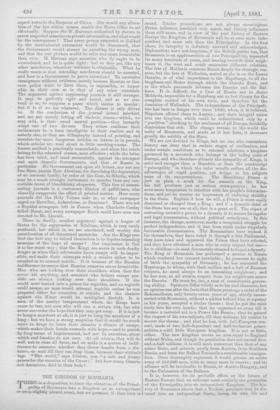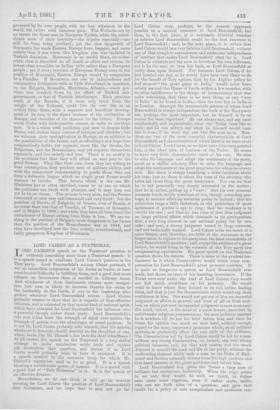THE KINGDOM OF ROUMANIA.
THFARE is a disposition to treat the elevation of the Princi- pality of Roumania into a kingdom as an unimportant or evea,stightly absurd. event, bat we question if that view is
sound. Titular promotions aro not always meaningless. Forms influence mankind very much, and history influences them still more, and in view of the past history of Eastern .Europe the Kingdom of Roumania will be at-once more inde- pendent and more safe than the Principality. In the first place, its integrity is definitely asserted and acknowledged. Diplomatists have not forgotten, if the British public has, that Roumania is an agglomeration of two Principalities, separated for many hundreds of years, and bearing towards their neigh- bours to the west and south somewhat different relations. The fate of Moldavia concerns Russia deeply for strategic rea- sons, but the fate of Wallachia, seated as she is on the Lower Danube, is of vital importance to the Hapsburgs, to all the kingdoms and States through which the Danube flows, and to the whole peninsula between the Danube and the Bal- kans. It is difficult for a Czar of Russia not to desire Moldavia, impossible for a Hapsburg not to feel thirsty for the complete control of his own river, and therefore for the dominion of Wallachia. The independence of the Principali- ties has been in danger ever since 1860, when, it is believed, Napoleon offered them to Austria ; and their integral union into one kingdom, which could be redistributed only by a " partition " shocking to the sentiment of all Europe, decidedly diminishes that risk. The change reveals to the world the unity of Roumania, and made as it has been, it increases greatly the solidity of the State.
We are not devoted to Kings, but no one who remembers history can ,deny that in certain stages of civilisation, and under certain conditions as to external relations, a kingdom governed by a monarch who belongs to the 'ruling caste of Europe, and who therefore attracts the sympathy of Kings, is safer and stronger than a Republic, or than the nondescript " principality " in which the ruler usually suffers all the dis- advantages of regal position, yet brings to his subjects none of its compensations. The Hereditary Prince is just as plain a mark for the assassin as the King, his fall produces just as serious consequences ; he has even more temptation to interfere with his people's determina- tions, and yet he creates no impression of enduring stability in the State. Explain it how we will, a Prince is more easily dismissed or changed than a King ; and if a dynastic chief of the State has any use at all, that is a great evil. The object of entrusting executive power to a dynasty is to ensure its regular and legal transmission, without political cataclysms. In this instance, the change, moreover, marks a completed struggle for perfect independence, and it has been made under singularly favourable circumstances. The Roumanians have wished it for themselves, they have voted it through a free Parliament, they have tried and approved the Prince they have selected, and they have obtained a man who in every respect but one— he is childless—is most fortunately situated to found a dynasty. The King of Roumania has performed a service to Russia which rendered her consent inevitable ; he possesses by right of birth the sympathy of Germany ; he has reassured the Hapsburgs, to whom, with their million and a half of Rouman subjects, he must always be an interesting neighbour ; and he has won, at all events, respect from his neighbours across the Danube. He must .be, too, a man of considerable govern- ing ability. Opinions differ widely as to his real character, but no opinion can alter the facts that fifteen years ago a cadet of the Hohenzollerns, only twenty-seven years of age, utterly uncon- nected with Roumania, without a soldier behind him or a penny in his purse, accepted a titular throne ; that he got the reins fairly into his own hands ; that he organised an army till it became a material aid to a Power like Russia ; that lie gained the respect of his own subjects, till they welcome his resolve to mount the throne ; and that he has, with full European con- sent, made of two half-dependent and half-barbarous princi- palities a solid little European kingdom. It is not so little, either. The new kingdom covers an area equal to England without Wales, and though its population does not exceed five- and-a-half millions, it is still more numerous than that of any minor State, and attracts yearly from Austria, from Southern Russia, and from the Balkan Peninsula a considerable immigra- tion. Once thoroughly organised, it would possess an active army of 150,000 men, with as many more in reserve ; and its alliance will be invaluable to Russia, to Austro-Hungary, and to the Federation of the Balkans.
It is, however, for its probable effect on the future of Eastern Europe that wo welcome most cordially the promotion
of the Principality into an independent Kingdom. The his- tory of Roumania shows that a Turkish province maybe ele- vated into an independent State, living its own life and
governed by its own people, with no loss whatever to the world, but rather with immense gain. The Wallachs are by no means the finest race in European Turkey, while the subor- dinate races of their territory—the Gipsies especially—are still far from being civilised ; yet the slow up-growth of Roumania has made Eastern Europe freer, happier, and more orderly than it was when this. kingdom also was included in Turkish dominion. Roumania is no model State, its aristo- cratic class is described on all hands as effete and vicious, its lowest class resembles an Indian tribe rather than a European people ; yet if every province of European Turkey were in the position of Roumania, Eastern Europe would by comparison be a Paradise. If Roumania can rise to independence and comparative civilisation with so little disturbance to mankind, so can Bulgaria, Roumelia, Macedonia, Albania,—every pro- vince now crushed down by the effect of Turkish mis- government, or fear of Turkish interference. Each province south of the Danube, if it were only freed from the weight of the Sultanet, could live its own life as an orderly little State, with a separate and beneficial develop- ment of its own, to the direct increase of the civilisation of Europe, and therefore of its chances for the future. Europe needs States with their possible careers, in order to develope men. It is a whim with publicists just now to despise little States, and declare them centres of intrigue and disorder ; but we welcome their multiplication in Europe, as an addition to the possibilities of the future, and as affording a new hope that comparatively feeble, yet separate, races like the Greeks, the Bulgarians, and the Roumanians, may yet organise themselves separately, and live orderly and free. There is no reality in the professed fear that they will afford an easy prey to the great Powers. They like their own lives, they are willing to bear conscription, they produce men of military ability, and with the commonest statesmanship to guide them they can form a defensive league, which no single great Power would venture to invade. This future,• which is the one Mr. Gladstone has so often sketched, seems to us one on which the politician can dwell with pleasure, and it may turn out yet to be no dream. The process is very slow, and the Powers concerned at once very self-interested and very timid ; but the position of Ser via, of Bulgaria, of Greece, even of Bosnia, is no worse than was that of Venetia, of Tuscany, of Romagna, and of Naples in 1860 ; and while they have all been freed, the disturbance of Europe arising from them is less. Wo see no- thing in the position of Bulgaria more dangerous to her future than the position of the Hospodarates was in 1848, and they have developed into the free, orderly, constitutional, and fairly prosperous Kingdom of Roumania.

































 Previous page
Previous page